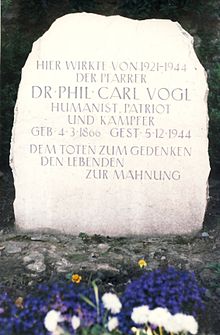Carl Vogl
Carl Vogl (born March 4, 1866 in Bechyně ; † December 5, 1944 in Vierzehnheiligen (Jena) ) was a philosopher, Protestant theologian and religious socialist.
Life
He was the son of the Catholic lawyer and senior administrative officer (governor and Austrian state councilor) Johann Baptist Vogl. The ancestors were also lawyers. In his own words, he experienced a "enthusiastic and pious childhood" in a hierarchically organized, conservative thinking, monarchistically convinced and Catholic-oriented social class. After the visit of the German state secondary school in Prague , he studied there philosophy , philology and history , then in Berlin , Freiburg , Tübingen and Leipzig , where he became a doctor of philosophy doctorate . After a period of changes in his beliefs , he converted to the evangelical faith. This was followed by a study of theology in Jena . In 1895 he was ordained a Thuringian pastor in Meiningen , became parish vicar in Steinach and parish administrator and finally in 1898 pastor in Leislau near Camburg . After he had given a lecture on the spectrum of parties before the Reichstag elections in 1907, a manor owner denounced him at the Meiningen consistory . He received a severe reprimand and was transferred to Untereubrunn . From there he was transferred again to Vierzehnheiligen in 1921. Because of his Jesuan way of thinking, Vogl found a connection to religious socialism early on and joined the Association of Religious Socialists in Germany . For him, the emerging social democracy was comparable to the work of the good Samaritan in Jesus' parable. In 1924 he was put on hold and in 1930 he retired.
Vogl was a staunch opponent of the war. In 1917 he joined the "Losen Vereinigung Evangelischer Friedensfreunde", which published the "Declaration of German Protestants on the Peace Question" in autumn 1917. After the November Revolution he became the first incumbent pastor in the German Reich in 1919 for some time to be a member of the state parliament of the Free State of Saxony-Meiningen with the mandate of the SPD . In 1926 he took part in a trip of the " Community of Proletarian Freethinkers of Germany " to the Soviet Union , which had a strong impact on him. Among other things, he met Lenin's widow Nadezhda Konstantinovna Krupskaya there . In the 1920s he campaigned against the emerging danger of fascism . In 1926 he joined the "Brotherhood of Socialist Theologians of Germany". During the Second World War he took part in the resistance actions of the Neubauer-Poser group . He gave shelter to the persecuted.
Vogl died in 1944 as emeritus in the vicarage of Vierzehnheiligen - meanwhile inwardly far removed from his Protestant regional church .
Aftermath
In the 1980s, three Soviet academics visited Vierzehnheiligen to seek out his gift, which is only decorated with a simple stone cross. Thereupon they suggested to the state authorities to erect a memorial stone for the anti-fascists in the village square.
Own works
- Modern man in Luther , Jena 1908
- David Hume: About the human mind . Translation, Leipzig 1910
- The Protestant Church and the War , Leipzig 1918
- Peter Cheltschizky - a prophet at the turn of times , Zurich and Leipzig 1926
- Peter Cheltschizky and the Bohemian Brothers , Zurich and Leipzig 1928
- Confessions of a pastor , Vienna, Berlin 1930
editor
- Cheltschizky: The network of faith , Dachau 1924
literature
- Walter Bredendiek : The big things are reflected in the small things. The life's work of Dr. Carl Vogl, = VIEWPOINT. Evangelical Monthly No. 10 and 12, 1977, No. 2 and 4 1978 ( online pp. 175-195. )
- Michael Rudloff : Dr. Carl Vogl (1866-1944). Memory of a border commuter, in: “Herbergen der Christenheit” 1997/98. Yearbook for German Church History, Leipzig 1998, pp. 189–200.
- Michael Rudloff : Carl Vogl and Emil Fuchs - Two extraordinary biographies at the intersection of church and labor movement, in: Kurt Reiprich, Kurt Schneider, Helmut Seidel and Werner Wittenberger (eds.): Christianity, Marxism and the work of Emil Fuchs, Leipzig 2000, Pp. 54-67
- Joachim Willems : Art. Vogl, Carl Theodor Johann Georg. In: Biographisch-Bibliographisches Kirchenlexikon, Volume XXV (2005), Sp. 1410-1414.
- Joachim Willems : Pastor Dr. phil. Carl Vogl as a member of the SPD in the state parliament of Saxony-Meiningen. In: Thuringian Landtag (ed.): Churches and ecclesiastical tasks in the parliamentary debate in Thuringia from the early 19th to the end of the 20th century. Weimar 2004, pp. 73-81.
- Joachim Willems : Pastor Dr. phil. Carl Vogl (1866–1944): A border crosser between Christianity, anarchism, socialism and spiritualism. In: Church contemporary history. International half-yearly publication for theology and history No. 2 (2004), pp. 396–418.
- Joachim Willems : Typification of revolution conceptions: considerations for the construction of a mystical-anarchist type. Fritzen, Florentine / Bavaj, Riccardo: Germany - a country without revolutionary traditions? Revolutions in Germany of the 19th and 20th centuries in the light of more recent intellectual and cultural-historical findings. Frankfurt / M. u. a. 2005, pp. 29-42.
Individual evidence
- ↑ Bredendiek, Walter: In the month of remembrance of the Reformation ... - The prehistory of the declaration of German Protestants on the peace question of autumn 1917. In: Evangelisches Pfarrerblatt (1967), No. 3, pp. 58-62.
| personal data | |
|---|---|
| SURNAME | Vogl, Carl |
| BRIEF DESCRIPTION | German theologian |
| DATE OF BIRTH | March 4, 1866 |
| PLACE OF BIRTH | Bechyně |
| DATE OF DEATH | December 5, 1944 |
| Place of death | Vierzehnheiligen (Jena) |

